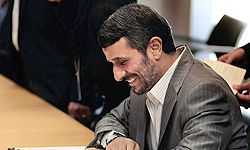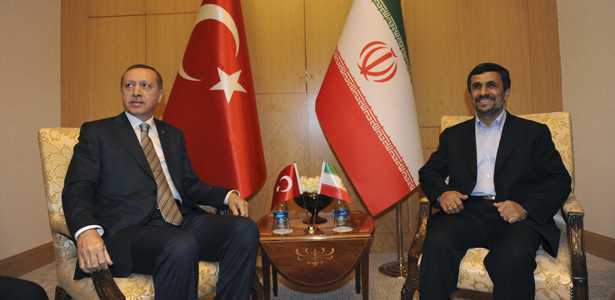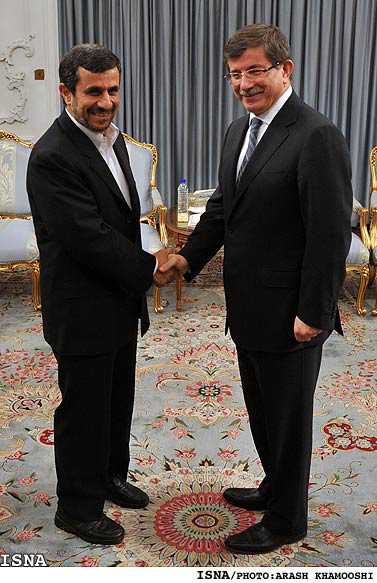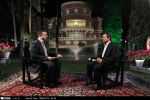After years of tenuous cooperation, the two regional powers look increasingly like competitors.
Iranian President Mahmoud Ahmadinejad meets with Turkish Prime Minister Recep Tayyip Erdogan in Istanbul / Reuters
Turkey’s ruling Justice and Development Party appears to be recalibrating its Iran policy and increasingly distancing itself from the more vocal support it previously gave the Iranian regime. As the two powers tussle over Syria, Iraq and other issues, analysts warn that their rivalry for leadership in the Middle East is only likely to sharpen.
But, for now, at least officially, Turkey maintains that it is still committed to maintaining its outreach to Iran and moving beyond the mutual suspicions that characterized the two countries’ relations in decades past.
“We are doing our best to create the atmosphere for dialogue,” one senior Turkish diplomat, speaking on condition of anonymity, told me. “Yes, we don’t agree about all issues with Iran — about what’s happening in Iraq, in Syria — but that doesn’t mean we shouldn’t talk with them. We are expressing our concerns and reactions with them about everything face-to-face.”
Some recent statements from Turkish officials, though, suggest a more complex picture.
At a February 5 meeting of the Justice and Development Party, Deputy Prime Minister Bulent Arinc delivered a blistering critique of Iran’s policy of support for Syrian President Bashar al-Assad despite the Syrian government’s bloody crackdown on opposition strongholds.
“I am addressing the Islamic Republic of Iran: I do not know if you are worthy of being called Islamic,” Arinc said, according to the Anatolia state news agency. “Have you said a single thing about what is happening in Syria?”
This tone represents quite a change from 2009, when Turkish President Abdullah Gül was among the first world leaders to congratulate Iranian President Mahmoud Ahmedinejad on his contested reelection, or in 2010, when Ankara put its relationship with Washington on the line by voting against Iran sanctions in the United Nations Security Council.
News coverage also comes with a sharper edge. The Turkish press has increasingly started running articles that cast suspicions on Iran’s intentions in the region and in Turkey, with some recent reports and columns suggesting that the Revolutionary Guards were planning attacks inside Turkey and that Iran is smuggling weapons through the country to Syria.
Hugh Pope, Turkey project director for the Brussels-based International Crisis Group, and one of the authors of a report on Iran and Turkey to be released on February 23, believes that Ankara’s more critical stance toward Iran indicates that “[t]he more hawkish faction in Ankara, the kind that thinks Iran is crossing the line in Syria and Iraq, is becoming more pronounced . . .”
Turkish Prime Minister Recep Tayyip Erdoğan “feels personally burned by the Iranians . . . ” Pope commented. “Erdoğan likes to have wins and the risks he took for Iran did not pay off, either in the US or Iran.”
But the two sides’ mutual wariness is not always consistent. An Iranian general earlier threatened a retaliatory strike if Turkey hosted a North Atlantic Treaty Organization missile radar, but, nonetheless, Tehran has also proposed Istanbul as a possible site for another round of talks about Iran’s nuclear research program.
Much of the Turkish-Iranian sparring is done instead via proxies. In Iraq, Turkey’s neighbor to the south, Ankara’s support for the Sunni Iraqiya alliance resulted in a falling out with Iranian-backed Prime Minister Nouri al-Maliki, who has since gone on to accuse Ankara of “interfering” in Iraq’s internal affairs.
“There is quite a strong and growing rivalry between the two countries inside of Iraq, and it stems from having genuinely different interests,” said Sean Kane, a former UN official in Iraq and the author of a 2011 report on Turkish-Iranian competition in Iraq for the United States Institute of Peace.
“For Turkey, having a strong Iraq has historically been a bulwark against Kurdish separatism and Iranian adventurism. Iran looks at all of this very differently. A strong Iraq is a rival, and historically has been a hard security threat.”
Trade between Iran and Turkey, long a buffer against bad relations, also appears to offer little room for cooperation.
While trade between Turkey and Iran shot up from $1 billion in 2000 to $16 billion last year, most of that consists of Turkish imports of natural gas and oil. Joint ventures between Turkish and Iranian companies have failed to materialize and several large projects that were given to Turkish concerns ended up being taken away with little warning or explanation.
“I don’t see Turkey’s outreach to Iran working,” said an executive at a large Turkish trade organization. “There’s no transparency or accountability in Iran. Turkish companies have had a very hard time penetrating the Iranian market.”
Despite Prime Minister Erdoğan’s multiple trips to the country, “Turkey didn’t get any deals out of Iran,” added the executive, who declined to be named. “Recent developments . . . will only make it harder.”
Still, despite the numerous points of friction and the growing rivalry, few observers expect outright conflict between Ankara and Tehran.
“I don’t think Turkey has any intent to fight Iran. In fact, it would like to avoid that at any cost,” said Turkish political analyst Soli Ozel, a professor of international relations at Istanbul’s Kadir Has University. “There are too many common interests between the two countries, although that’s never stopped them from competing fiercely in the region.”
What is most likely, Ozel said, is that Turkey and Iran will revert to the elaborate kind of diplomatic gamesmanship that has characterized the relations between these two regional powers and rivals for centuries.
“It’s all smiles between Turkey and Iran, but that’s very typical of the relationship between these two countries, which is competition and cooperation wrapped up in a total lack of trust.”
This article originally appeared at EurasiaNet.org, an Atlantic partner site.






